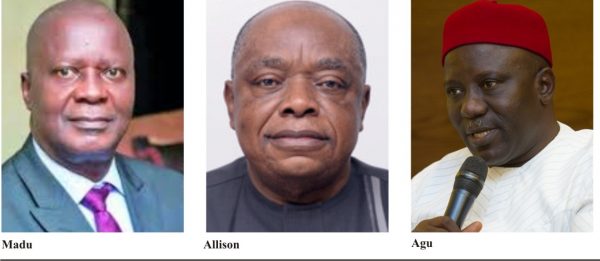CBN And Naira Undertakers

Towards the end of 2014 and February 18, 2015, two events of same outcome took place- the naira devaluations. These times, the actions were regulatory induced. In fact, there were many against the regulator than those with it. Of course, beside the touted benefits for the actions, there were serial consequences lying in wait for the economy.
Shortly after these devaluations, the combination of inflation, took tolls on the nation’s economic activities, eroding naira value and consequently pushed the sovereign debt stock to ₦12.12 trillion.
Besides the concern for eroded value of the currency, which requires more Naira to offset the national debt stock when denominated in dollar terms, a conservative estimate of about N920 billion was lost to the current exchange rate, occasioned by devaluation, even at lower debt stock of $63.5 billion (June 2015), compared to $67.7 billion in December 2014.
Already, an assessment of the economy from then till now showed that the manufacturing, banking and petroleum sectors, as well as the attendant rising cost of living and bloated exchange rate at the parallel market were all having a full share of varying challenges.
Granted, the policy measure helped to reduce the pressure on the currency as at then, but it never ended it, because the underlying factors, which bothered on the macroeconomic environment never abated, even now. For example, the tottering prices of crude oil.
Towards the end of 2014, the Central Bank of Nigeria (CBN) had devalued the currency by 6.8 per cent, in a development blamed on assessed irregularities in foreign exchange (forex) market, mostly perpetrated by operators and banks were ‘silently’ mentioned, but Bureau De Change Operators featured prominently. The same is the case now.
However, the second devaluation in February 2015, which was 20.1 per cent deep, jolted various economic sectors, with assessable consequences already on ground then, while others unfolded later, even to date.
CBN, in a statement announcing the decision said: “The managed float exchange rate regime, which the bank had adopted following the liberalization of the foreign exchange market, has for the most part been successful in ensuring exchange rate stability in line with its mandate.
“In recent times, however, with the sharp decline in global oil prices and the resultant fall in the country’s foreign exchange earnings, the bank has observed a widening margin between the rates in the interbank and the Retail Dutch Auction System (rDAS) window, thus engendering undesirable practices including round-tripping, speculative demand, rent-seeking, spurious demand, and inefficient use of scarce foreign exchange resources by economic agents.
“This has continued to put pressure on the nation’s foreign exchange reserves with no visible economic benefits to the productive sector of the economy and the general public. In view of the foregoing, it has become imperative that appropriate actions be taken to avert the emergence of a multiple exchange rate regime and preserve the country’s foreign exchange reserves.”
Indeed, the rDAS/wDAS foreign exchange window was closed, with migration to the Interbank Foreign Exchange Market, where CBN continuously intervened to “meet genuine/legitimate demands,” as part of its defense for the naira.
The devaluation, which stemmed from the need to rein multiple forex rates that was assessed to be fuelling speculations on the naira, unfortunately shifted its position to the parallel market, with a dollar going for over N230 then. The stakeholders thus, found it alluring, even beyond resistance to arbitrage, hoard and speculate with the dollars bought at low rate and official window. It got worse as the foreign exchange earnings’ capacity of the country dwindles. This is the story of the quest for third devaluation in less than 24 months now.
CBN has put its feet on the ground for months in defiance of the call that is mostly dominated by foreign investors and their local allies. This defiance has taken forms of capital control, scrutiny of forex demands and rationings, among others. The current administration has even thrown its weight behind the monetary authority. But the fight seems to be getting heavier and out of control with each day passing on poor record of crude oil price performance- our major source of foreign exchange earnings.
The International Monetary Fund (IMF) commended CBN for shutting down the bi-weekly forex window and other policy responses to the instabilities, but noted that concerns still persist over lower oil prices and socio-political tension in the horizon in the country- approaching elections then and terrorism. But now, IMF’s “lyrics” is for CBN to open its reserves or devalue. But to whose interest?
But, while there were acclaimed successes in exchange rate stability then by the authorities, it appeared yet to trickle down to the general foreign exchange market developments. For example, from then till now, the parallel market dominated activities with widening gap that kept extending its frontier till today at N302/$.
Nigerians, even those that had no business with foreign currency, saw business in demanding for them, while those in the “corridors of power” took advantage of their position to draw from the reserves in the name of public business and interest, but ended up “dollarizing” the economy and serviced their personal interests. The development really had far-reaching implications and for sure, more consequences are in the offing.
Experts however, have had divergent fronts on the outcomes of devaluation, but not one of the views has been totally palatable. For some, it will provide government with quantity of the naira, as well as represent the actual value of the currency, while others have expressed concerns that local companies and the masses will be worse off.
The Group Managing Director of Afrinvest West Africa Limited, Ike Chioke, said we must devalue now because foreign exchange illiquidity and low earnings are putting the country in a position of uncertainty, which will not allow the foreign investors to bring in their money.
An economist and Managing Director of Financial Derivatives Limited, Bismarck Rewane, said devaluation makes more naira available for governments at various levels, as well as the availability of the dollar and the actual value of the local unit.
For the Lead Director of the Centre for Social Justice, Eze Onyekpere, the devaluation of the currency without increasing the earnings power of Nigerian families, ultimately devalues the standard of living of the people.
“When this is combined with the inflation rate of over eight per cent, it will be clear that the fiscal and monetary authorities have done a great disservice to the Nigerian people. All money saved in the bank will lose value,” he said.
In all the propositions, exports did not become cheaper after the devaluation. Besides, in an economy that exports little, but heavily import-dependent, the solution lies in developing our capacity for production of goods and services, value addition and transformation of raw materials into finished goods and products. From then till now, these are still underdeveloped.
Already, as more naira go for a single dollar, one can only imagine how much of commodity export will equal the total import bills of not only consumables and raw materials, but machineries and equipment.
Maybe, now that our fundamentals are down, devaluation may work. But judging from the past, it may remain the same of even worse. The meeting that is laden with expectations- devaluation, exchange rate, budget deficit and inflation is ongoing. Whatever the outcome, only time will tell better.
Culled from The Guardian







